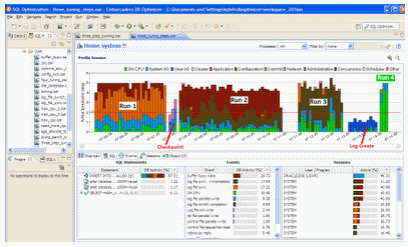In the above DB Optimizer screen, the same workload ran four times. We can see that the time (width of the load) reduced, and the percent of activity on CPU increased.
Runs:
- In Run 1, the orange "log file sync" area is the largest, which means uses are waiting on commits even though we are committing less in the code. In this case we moved the log files to a faster device. You can see the checkpoint activity just after run 1 where we moved the log files.
- In Run 2, the dark red "buffer busy wait" area is the largest. We drilled down on the buffer busy wait event in the Top Event section and the details tell us to move the table from a normal tablespace to an Automatic Segment Space Managed tablespace.
- In Run 3, the dark brown "log file switch (checkpoint incomplete)" are is the largest, so we increased the size of the log files. You can see the IO time spent creating the new redo logs just after Run 3. The run time is the shortest and all the time is spent on the CPU which was our goal, to take advantage of all the processors and run the batch job as quickly as possible.
- The run time is the shortest and all the time is spent on the CPU, which was our goal to take advantage of all the processors and run the batch job as quickly as possible.
